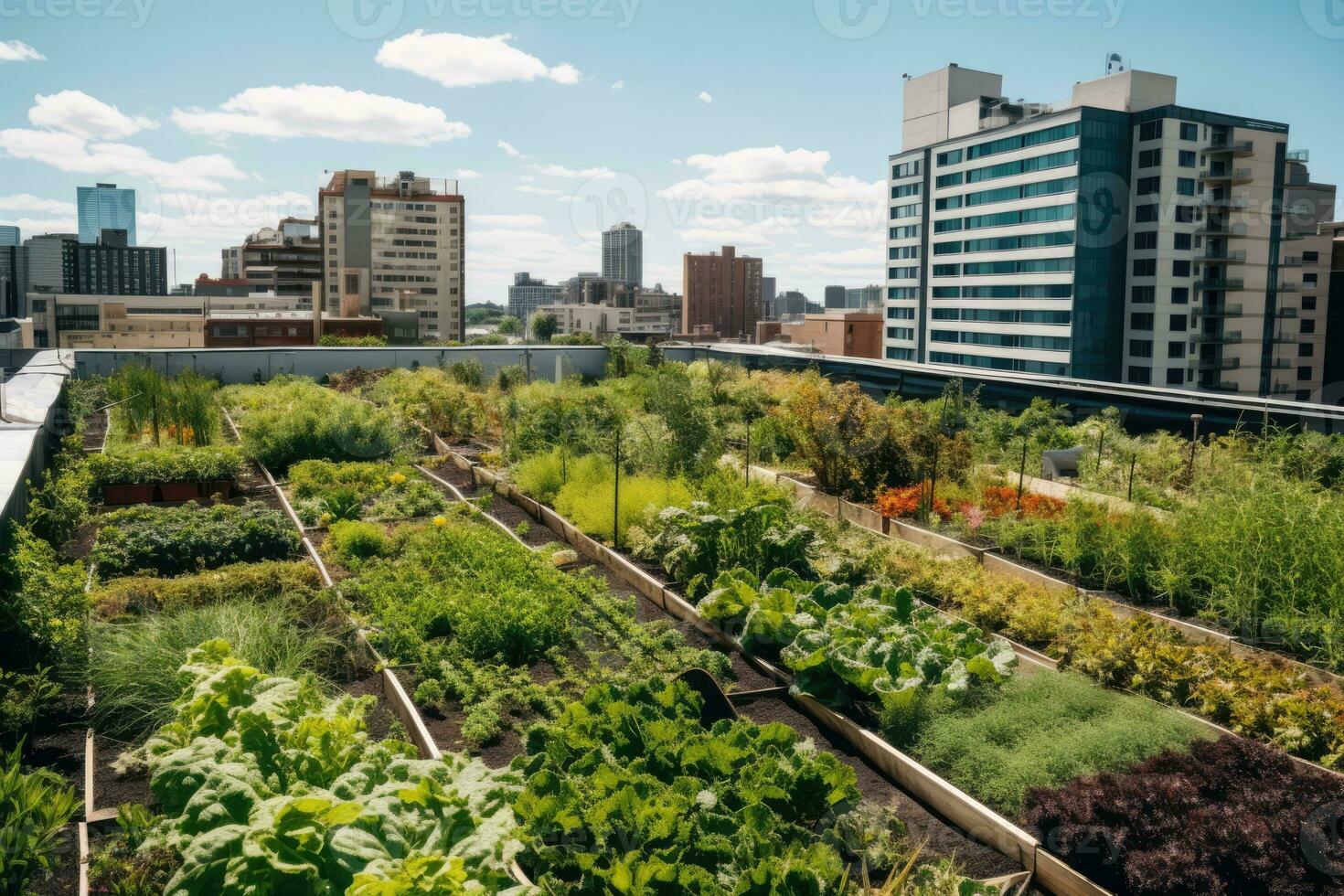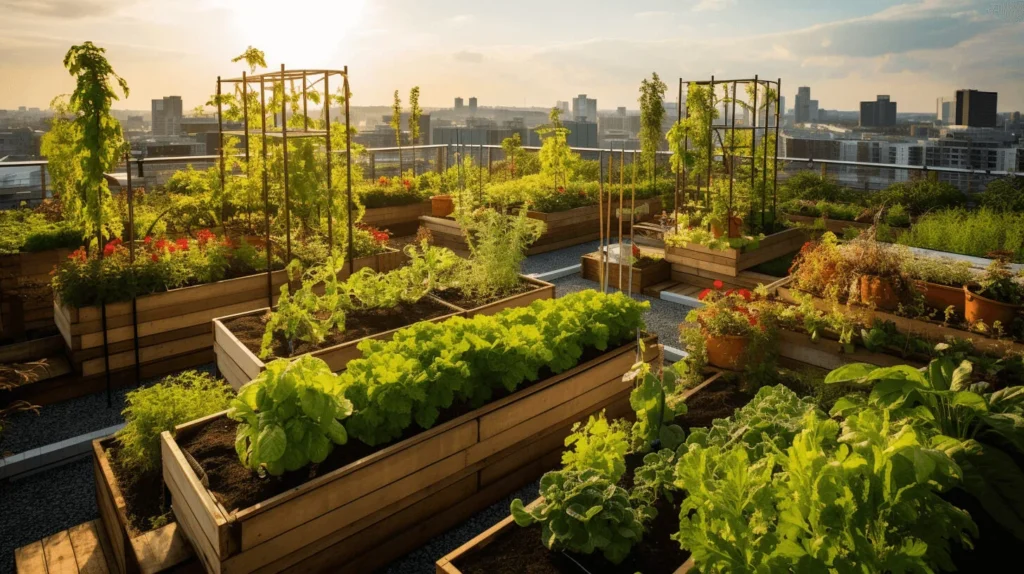Imagine stepping out onto your rooftop and being greeted by a vibrant, lush garden teeming with fresh produce, all grown organically. Sounds like a dream, right?
But it’s not just a dream—it’s a reality you can create with organic farming for urban rooftop gardens. Whether you’re a seasoned gardener or just starting out, transforming your rooftop into a green oasis can be both fulfilling and beneficial.
Not only does it provide you with fresh, healthy food, but it also transforms your living space and contributes to a more sustainable environment. Are you ready to discover how you can turn your rooftop into an organic haven? Let’s dive into the essentials that will help you get started and succeed in this rewarding endeavor.
Benefits Of Urban Rooftop Gardens
Urban rooftop gardens promote organic farming by providing fresh, pesticide-free produce. These gardens enhance air quality and reduce urban heat. They transform unused spaces into green havens, offering a sustainable solution for city dwellers seeking healthy, homegrown food.
Urban rooftop gardens are sprouting up across cities, offering a refreshing green escape amidst the concrete jungle. These gardens do more than just add beauty; they bring numerous benefits to urban dwellers. Imagine transforming your rooftop into a lush sanctuary, where you can grow fresh produce, improve air quality, and enjoy a slice of nature right above your head.Environmental Impact
Rooftop gardens help combat urban heat by absorbing sunlight and reducing the temperature. This can lead to lower energy bills as your building remains cooler. Plus, plants filter air pollutants, making the air around you cleaner. Have you ever considered how much pollution you could reduce by simply growing plants on your roof?Food Security
Growing your own food in a rooftop garden can significantly reduce your dependency on store-bought produce. You can enjoy fresh vegetables and herbs that are free from pesticides. It’s empowering to know exactly where your food comes from. Have you ever tasted a tomato that you grew yourself? The flavor can be surprisingly richer.Community Building
Rooftop gardens can serve as communal spaces, fostering social interactions among neighbors. Sharing gardening tips and harvests can build friendships and strengthen community ties. Picture hosting a small gathering in your garden, surrounded by vibrant plants and shared laughter. Wouldn’t that create lasting memories?Stress Relief
Gardening has been shown to reduce stress and promote mental well-being. The act of nurturing plants can be therapeutic. Imagine spending a few quiet moments amidst your plants, listening to the rustle of leaves and breathing in fresh air. Could this be the perfect antidote to a hectic city life?Space Utilization
Urban areas often suffer from space constraints. Rooftop gardens utilize otherwise neglected spaces, turning them into productive areas. This creative use of space can be especially beneficial in crowded cities. Have you ever thought of your rooftop as a potential garden rather than just an empty space? Creating a rooftop garden can transform both your environment and lifestyle. The benefits are tangible, from improving air quality to providing fresh food and building community bonds. By embracing this green initiative, you’re not just cultivating plants; you’re nurturing a better way of living.
Essential Techniques For Organic Farming
Urban rooftop gardens offer a green escape in concrete jungles. Embracing organic farming techniques can transform these spaces into thriving ecosystems. Organic farming focuses on natural processes, avoiding synthetic chemicals. This approach enhances soil health and promotes biodiversity. Let’s explore essential techniques to make your rooftop garden flourish.
Soil Preparation
Healthy soil is the foundation of organic farming. Start with a soil test to understand nutrient levels. Add organic compost to enrich the soil. Compost improves soil structure and provides essential nutrients. Use mulch to retain moisture and suppress weeds.
Natural Pest Control
Pests can be a challenge in urban gardens. Organic farming uses natural methods to control them. Introduce beneficial insects like ladybugs to eat harmful pests. Planting marigolds can deter unwanted bugs. Keep plants healthy to resist infestations.
Water Conservation
Water is precious in urban settings. Collect rainwater for irrigation. Use drip irrigation systems to minimize waste. These systems deliver water directly to plant roots. Mulching helps retain soil moisture, reducing water needs.
Crop Rotation
Crop rotation prevents soil depletion. Rotate different plant families each season. This practice reduces pest build-up and enhances soil fertility. It mimics natural ecosystems, promoting plant health.
Companion Planting
Companion planting boosts garden productivity. Pairing certain plants together can enhance growth. For example, basil planted with tomatoes can improve flavor. It also attracts beneficial insects.
Organic Fertilizers
Organic fertilizers nourish plants naturally. Use fish emulsion, seaweed extract, or bone meal. These sources provide essential nutrients without harming the environment. Apply fertilizers sparingly to avoid nutrient overload.
Seed Selection
Choose seeds wisely for organic farming. Opt for non-GMO and heirloom varieties. These seeds are often more resilient and flavorful. They preserve biodiversity and traditional plant strains.
Choosing The Right Plants
Choosing suitable plants is crucial for successful organic farming on urban rooftops. Opt for low-maintenance varieties that thrive in limited space, such as herbs, tomatoes, and lettuce. Consider sunlight, wind exposure, and weight capacity when selecting plants for your rooftop garden.
Choosing the right plants for your urban rooftop garden is crucial for a thriving and sustainable organic farming experience. The plants you select will not only determine the garden’s productivity but also its resilience to the unique conditions of rooftop environments. Understanding which plants are best suited to thrive in your specific setting can make all the difference in cultivating a successful green oasis above the city. ###Understanding Your Rooftop Environment
Before planting, assess your rooftop’s conditions. Is it sunny, shaded, windy, or humid? These factors influence which plants will thrive. For example, if your rooftop gets full sunlight, consider sun-loving plants like tomatoes and peppers. On the other hand, if it’s mostly shaded, leafy greens like lettuce or spinach may be more suitable. ###Choosing Plants With Shallow Root Systems
Rooftop gardens often have limited soil depth. Select plants with shallow roots to ensure they get enough nutrients and space. Herbs like basil and cilantro, as well as vegetables like radishes and carrots, are excellent choices. They grow well in shallow soil and are perfect for container gardening. ###Opting For Drought-resistant Varieties
Water management is crucial for rooftop gardens. Drought-resistant plants are ideal for conserving water and ensuring survival during dry spells. Succulents, lavender, and rosemary are good options. They require less frequent watering and are hardy against varying weather conditions. ###Growing Seasonal And Native Plants
Native plants are adapted to your local climate and require less maintenance. They also support local wildlife and encourage biodiversity. Consider seasonal plants that align with your regional weather patterns. This approach can yield more bountiful harvests and reduce the need for artificial interventions. ###Experimenting With Edible Flowers
Edible flowers add color and variety to your rooftop garden. They not only beautify the space but also offer unique flavors to your dishes. Nasturtiums, violas, and calendulas are delightful choices. Besides their aesthetic appeal, they are easy to grow and require minimal care. ###Planning For Vertical Growth
Maximize limited space by growing vertically. This method allows you to plant more without expanding your garden’s footprint. Consider climbing plants like beans and peas. They can be trained on trellises, transforming walls and fences into productive growing spaces. ###Engage With Your Garden
Cultivating a rooftop garden is an ongoing learning process. Spend time observing which plants thrive and which struggle. Don’t be afraid to experiment. Adjust your plant choices based on what you learn. What unexpected success or challenge have you faced in your garden? Your insights can guide your future plant selections. By thoughtfully selecting plants for your urban rooftop garden, you can create a thriving organic oasis that brings joy and sustenance right to your home.
Challenges And Solutions
Organic farming on urban rooftops offers many benefits. Yet, it also comes with challenges. Urban gardeners often face issues like limited space, soil quality, and weather conditions. Each challenge requires a thoughtful solution. Let’s explore these common obstacles and the ways to overcome them.
Space Constraints
Rooftops have limited space for gardening. This makes maximizing every inch crucial. Vertical gardening can help. Use trellises or shelves to grow more plants. Hanging pots also save space. Choosing compact plant varieties is another solution. They require less room but still yield well.
Soil Quality
Urban soil might not be ideal for organic farming. It can lack nutrients or be too compact. Adding organic compost improves soil quality. It enriches the soil with essential nutrients. Testing the soil before planting is wise. This helps identify deficiencies early. Consider using raised beds. They provide better control over soil quality.
Weather Conditions
Rooftops face harsh weather conditions. Wind and direct sunlight can harm plants. Windbreaks protect plants from strong gusts. Use barriers like screens or fences. Shade cloths help manage excessive sunlight. They prevent plants from drying out. Choosing resilient plant varieties is smart. They withstand urban weather challenges better.
Water Management
Watering rooftop gardens requires careful planning. Overwatering can lead to root rot. Underwatering stresses the plants. Drip irrigation systems are efficient. They provide consistent moisture without waste. Rainwater harvesting is another solution. It saves water and is eco-friendly. Regularly check the moisture level of the soil. This ensures plants get the right amount of water.

Conclusion
Urban rooftop gardens offer a green escape in city life. Organic farming on rooftops brings fresh produce close to home. It’s a healthy choice for you and the planet. Small spaces can yield big results with proper care. Grow vegetables, herbs, and fruits with simple methods.
Enjoy the rewards of nurturing plants. Connect with nature while living in urban areas. Every rooftop garden can make a difference. Start small, learn as you go. Share the joy of gardening with friends and family. Urban rooftop gardens make cities greener and healthier.
Embrace organic farming today!



